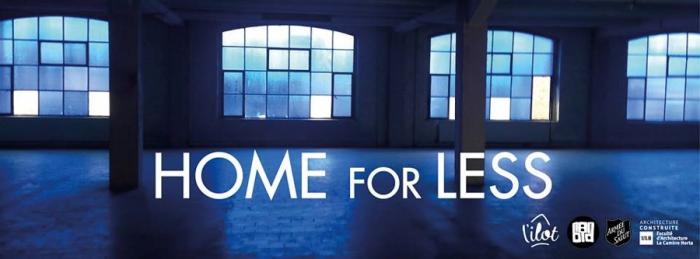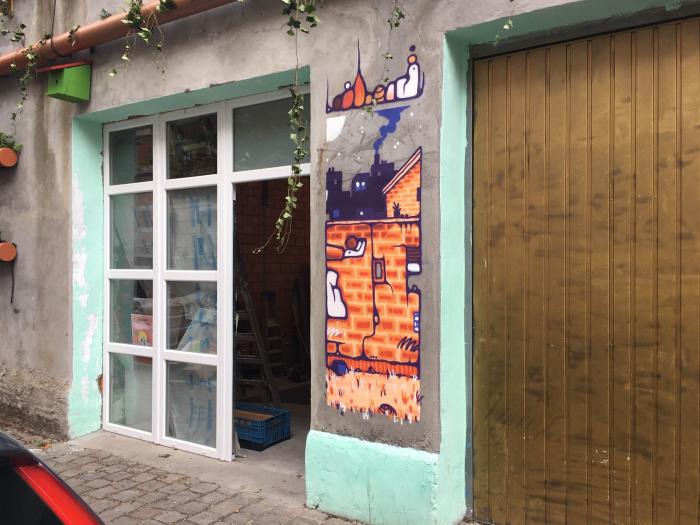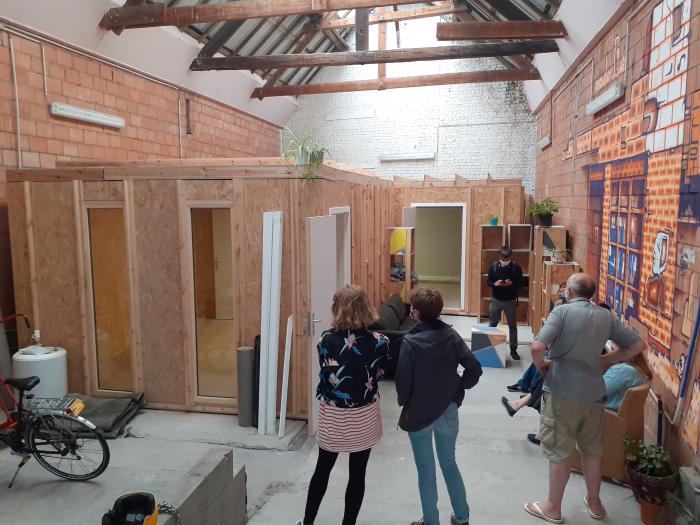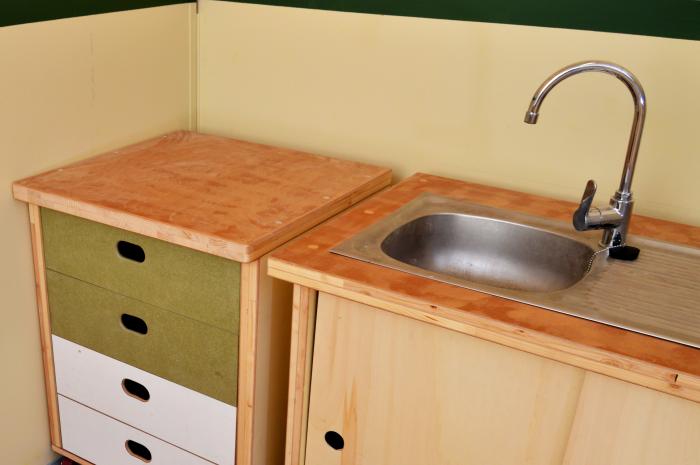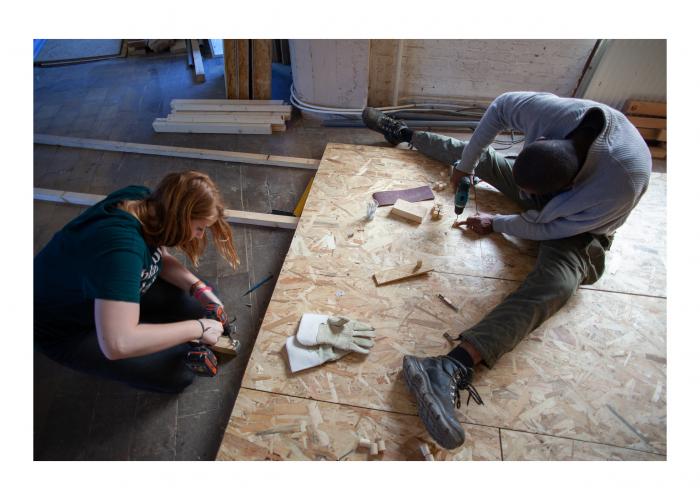I. SUMMARY INFORMATION
Project
268484
Status
Submitted
Award category
Modular, adaptable and mobile living solutions
You want to submit
NEW EUROPEAN BAUHAUS AWARDS : existing completed examples
Project title
Home4Less
Full project title
Home4Less: building modular flats for homeless people in vacant spaces
Description
HOME4LESS : quality temporary homes for the homeless. We build modular structures that can rehabilitate a temporarily unoccupied building not intended for housing and turn it into housing for those who do not yet have access to housing on the renting market. It is used as springboards towards permanent housing. The project involves experience experts, architects, social workers, and compagnies of socio-professionnal inclusion.
Where was your project implemented in the EU?
Belgium
Région Bruxelles-Capitale
Ixelles & anderlecht
Brussels
1050 & 1070
When was your project implemented?
Has your project benefited from EU programmes or funds?
No
Which programme(s) or fund(s)? Provide the name of the programme(s)/fund(s), the strand/action line as relevant and the year.
II. DESCRIPTION OF THE PROJECT
Please provide a summary of your project
In 2018, Bruss’help, coordinator for the homeless sector in the Brussels Region, counted 4187 homeless people in Brussels. In 2020, 5313 were counted. At the same time, the number of empty buildings in the city is growing and affordable housing is lacking. Innovative housing solutions are critically needed. Our project HOME4LESS aims at creating modular structures that can rehabilitate a temporarily unoccupied building and turn it into housing for those who do not yet have access to housing on the renting market.
In practical terms, Home4Less occupies empty spaces not intended for housing and we build modular structures (easily dismantled and reassembled). It creates studio appartements and shared living spaces. The occupants sign a temporary occupation permit (TOP), pay for water and electricity, and can save money each month on an account of the project aimed at building a rental guarantee for a future permanent housing.
The project started in 2017, with a research conducted by architecture students from La Cambre Horta (Université Libre de Bruxelles), on the idea of a ‘box-in-the-box’. Multiple collaborations with construction compagnies (engaging in socio-professional integration) then enabled to implement the project.
The modular studio flats have now been occupied for a few months and are planned to be occupied for about a year. There are located on two sites: one for women, one for men. A housing-related social support is provided, as well as assistance in finding permanent housing.
HOME4LESS is still in the experimental phase. We are conducting an evaluation, with the help of academics and in collaboration with other similar projects. It will determine the future of the project: where to rebuild the modular studios, what specific public to target, what adaptations are to be made according to the evaluation.
Please give information about the key objectives of your project in terms of sustainability and how these have been met
Rehabilitation of empty spaces: turning vacant spaces into housing possibilities. Urban revitalization.
Circularity: reused materials to build structures and furniture that can easily be dismantled and reassembled in a different place. Collaboration with building companies and organizations engaged in circularity and sustainability (CDR for eco-construction, Guilbard for furniture made of reused wooden boards, etc.)
Energy efficiency: studios thermally insulated and easy to heat, corks used as insulating material, smart boiler.
Other details: plants on the façade watered by the recuperation of rainwater dripping from gutters, organic waste put in a compost box, raising awareness on sustainable use of resources such as water.
Please give information about the key objectives of your project in terms of aesthetics and quality of experience beyond functionality and how these have been met
The architecture of our modular living solutions was defined after an in-depth research conducted by students of the faculty of architecture (Université Libre de Bruxelles). The plans were based, as much as possible, on the needs and experience of homeless people, through a process of feedbacks collection from experience experts and social workers.
For greater functionality, changes are made during the occupation, by a technician, a social worker, and with the help of the occupants and/or volunteers. It can result in a rearrangement of the kitchen furniture (that are modular too), painting, construction of new furniture, change of lightning, construction of outdoor spaces, creation of indoor plant areas, system to adapt shade area during summer, installation of a sport corner with a home bike, etc. It increases the sense of feeling at home and according to needs and requests made by the occupants.
A particular attention was paid to aesthetics and quality of experience. In each site, a wall fresco was painted, each from a different artist. The outsides of both buildings were also painted. One facade was decorated with perennial plants. These efforts regarding the aesthetics seem to improve the social integration of the inhabitants in their ne neighbourhood. It brings curiosity and is a good opportunity for discussions with neighbours. Both sites are integrated in locations were other social-professional and cultural projects are implemented. Some synergy and positive meetings are therefore fostered. We insist, with the public hosted by these experimental modular studio flats, on the importance of making it as comfortable as their home. All the furniture chosen by the occupants in our circular furniture service can be kept by the occupants when they move out to their permanent housing. It gives them opportunity both to save money for guarantee and to collect furniture they could not stock before. It is part of the preparation for their future permanent housing.
Please give information about the key objectives of your project in terms of inclusion and how these have been met
Inclusion through collaboration with social oriented companies: training on field of disadvantaged public, helping them to find a job in the building sector, lacking experienced workforce
Inclusion through housing is crucial. Our public comes from our 26 member services (members of our sectoral gathering, who we search and create housing for). All services accompany various specific homeless publics (young, women, men, long-term homelessness, addicts, dealing with mental health issues, in housing but at risk of losing it, etc.). The choice was made to prioritize, for this project, people with long-term homelessness experience, in urgent need for a personal home, and starting their search for a permanent home. The time in the modular studio flats is first used as a place to rest and feel safe. After a few weeks, other steps of preparation can be taken. A strong network can be rebuilt around the person. The high flexibility of the legal framework allows the occupants to leave the place as soon as they find a permanent home. We call it a “springboard” towards permanent housing.
Both sites are integrated in locations where other social-professional and cultural projects are implemented. Some synergies and positive meetings are therefore fostered. In one site, there are project of social inclusion through the learning of how to ride a bike, food accessibility, inter-cultural encounters, construction of wooden furniture and a project of mushrooms culture. In the other one, more than a hundred projects are gathered, such as hosting refugees, cultural activities, food recuperation, organic market, legal assistance, support for parenting, etc. It is the biggest temporary occupation in Belgium.
Please give information on the results/impacts achieved by your project in relation to the category you apply for
Integration of trainees of social oriented companies, students in architecture and volunteers in the development of a global project
Four modular studio flats built and ready to be moved after the end of their first occupation (one ending in January 2022, the other one in March 2022).
Four social services have chosen a candidate for the occupation of each module and participate in the project steering committee, resulting in a collaboration between five services working with homeless people.
Four people currently occupying the modular homes as a springboard towards permanent housing. Good appropriation of the spaces.
For one of them, it enabled access to social rights he did not have.
Steps are taken towards the search for permanent housing, administrative regularisation…, we already have a positive feedback from the occupants
Success regarding the social integration of the occupants in their new social environment. Positive interactions with the neighbourhood
Please explain the way citizens benefiting from or affected by the project and civil society have been involved in the project and what has been the impact of this involvement on the project
During the design phase: architecture students researched on modular homes and the needs of the future occupants. Awareness-raising on homelessness. Multiple professional panels assessing the project, including experts of expertise and social workers.
During the construction phase: the numerous partners chosen for the construction were all working in a mindset of urban resilience and social inclusion (Baya, Communa, Centre FAC, Centre de Référence Professionnelle Bruxellois pour le Secteur de la Construction, Gilbard asbl, etc.). The ‘collectif Baya’ organized participatory construction workshops.
Before moving-day: occupants chose their furniture, had the choice between two modular studio flats, discussed issues related to sharing a living room with another person. Adjustments were made according to their remarks, with the help from the people involved in projects on the same site, collective painting of some walls were organized with paint received for free from local painting firms.
During the occupation: improvements made with the occupants, meeting the neighbors, gardening, occupants deciding and writing rules for living together in the shared spaces.
All along the project: Sensitization of the public. Involvement of students in research about design but also later on about the appropriation of spaces and the experience of living in them. The occupants are always at the center of every decision and everything is made together, not for them but with them. Integration in the social environment.
The benefits or such a process are significant: sensitization of the public, improvement of design, involvement of the occupants, better appropriation of the homes, enriching meetings, gathering of diverse people, social integration, empowerment, fun and trust.
Please highlight the innovative character of the project
Social housing is slowly built and insufficiently provided. Organisations around the homeless sector call for more social housing but need urgent solutions. Creativity is required. Temporary occupation of large spaces (such as factories and offices) is a solution that we are willing to experiment. Modular studio flats enable us to use such spaces and turn them into comfortable homes to use as springboards toward permanent homes. The sharing of expertise is key to create appropriate solutions. We managed to gather architects, homeless people, social workers, construction experts and politics. It results into housing in-between individual and collective housing, easy to move and set-up, in a circular mindset, but with always the highest attention paid to quality of experience and functionality.
We created comfy homes where it was least expected, and we ensured quality social support.
Please explain how the project led to results or learnings which could be transferred to other interested parties
A network was created with other projects imagining innovative housing solutions for homeless people. It includes projects of tiny houses for the outside and modular homes to build inside large unoccupied spaces. It brings opportunities to share the recent experiences in such innovative projects. The learnings can be very practical, but also ethical, or about the social work. We are sharing our experience, pitfalls, being on the legal or the practical side, in order to allow these projects to be reproduced. This includes advocacy towards public authorities in order to facilitate this kind of occupancy and to develop permanent social housing allowing our public to settle down after their experience in these modules.
Is an evaluation report or any relevant independent evaluation source available?
No
III. UPLOAD PICTURES
IV. VALIDATION
By ticking this box, you declare that all the information provided in this form is factually correct, that the proposed project has not been proposed for the Awards more than once under the same category and that it has not been subject to any type of investigation, which could lead to a financial correction because of irregularities or fraud.
Yes
